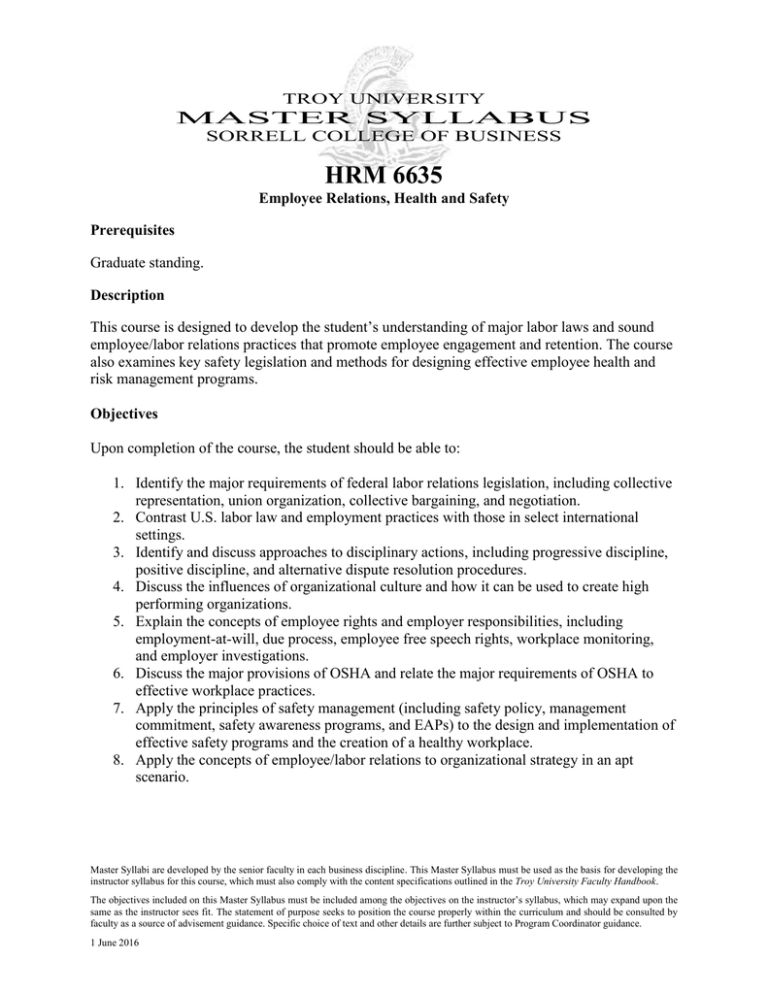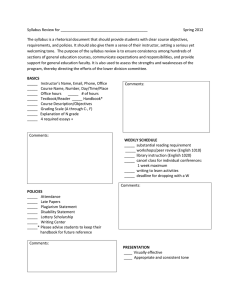HRM 6635 MASTER SYLLABUS
advertisement

TROY UNIVERSITY MASTER SYLLABUS SORRELL COLLEGE OF BUSINESS HRM 6635 Employee Relations, Health and Safety Prerequisites Graduate standing. Description This course is designed to develop the student’s understanding of major labor laws and sound employee/labor relations practices that promote employee engagement and retention. The course also examines key safety legislation and methods for designing effective employee health and risk management programs. Objectives Upon completion of the course, the student should be able to: 1. Identify the major requirements of federal labor relations legislation, including collective representation, union organization, collective bargaining, and negotiation. 2. Contrast U.S. labor law and employment practices with those in select international settings. 3. Identify and discuss approaches to disciplinary actions, including progressive discipline, positive discipline, and alternative dispute resolution procedures. 4. Discuss the influences of organizational culture and how it can be used to create high performing organizations. 5. Explain the concepts of employee rights and employer responsibilities, including employment-at-will, due process, employee free speech rights, workplace monitoring, and employer investigations. 6. Discuss the major provisions of OSHA and relate the major requirements of OSHA to effective workplace practices. 7. Apply the principles of safety management (including safety policy, management commitment, safety awareness programs, and EAPs) to the design and implementation of effective safety programs and the creation of a healthy workplace. 8. Apply the concepts of employee/labor relations to organizational strategy in an apt scenario. Master Syllabi are developed by the senior faculty in each business discipline. This Master Syllabus must be used as the basis for developing the instructor syllabus for this course, which must also comply with the content specifications outlined in the Troy University Faculty Handbook. The objectives included on this Master Syllabus must be included among the objectives on the instructor’s syllabus, which may expand upon the same as the instructor sees fit. The statement of purpose seeks to position the course properly within the curriculum and should be consulted by faculty as a source of advisement guidance. Specific choice of text and other details are further subject to Program Coordinator guidance. 1 June 2016 Master Syllabus: HRM 6635 2 Purpose: To provide a basic knowledge of major labor law requirements, employee relations practices, safety legislation, and features of effective employee health and safety programs. Approved Text:* Holley, W., Jennings, K., & Wolters, R. The labor relations process. Mason, OH: Cengage Learning.] Program SLOs Addressed by Assessment Component: 1. SLO 5.1: Students will demonstrate effective writing skills in preparing a research report. Assessment: The following materials are required in this course for assessment purposes. Assignment: Research paper (length to be determined by instructor) Related Rubric: Written Communication Rubric – MSHRM Program See related “Instructor Guidelines for Administering MSHRM Rubrics.” Student Engagement: Instructors in this course will add videos, movies, site visits, guest speakers, service learning projects, or other activities designed to engage students in experiential and active learning activities designed to improve skills and the application of knowledge within the business community. Optional Reference Materials* Friend, M., & Kohn, J. Fundamentals of occupational safety and health. Latham, MD: Rowman & Littlefield Publishing. Goetsch, D. Basics of occupational safety. Upper Saddle River, NJ: Prentice-Hall. * Note: The most recent edition is required unless otherwise specified. Troy University Faculty Handbook (2010): Section 3.9.2.8 [extract] — essential elements of the syllabus (somewhat modified for space): 1. Course title 2. Course number + section 3. Term 4. Instructor 5. Prerequisites 6. Office hours 7. Class days, times 8. Classroom location 9. Office location + e-mail address 10. Office telephone 11. Course description, objectives 12. Text(s) 13. Other materials 14. Grading methods, 16. General supports criterion weights, (computer works, make-up policy, writing center) mid-term grade 17. Daily assignments, reports holidays, add/drop 15. Procedure, course & open dates, dead requirements day, final exam 18. ADA statement 19. Electronic device statement 20. Additional services, statements 21. Absence policy 22. Incomplete-work policy 23. Cheating policy 24. Specialization requirements (certification, licensure, teacher competencies)



